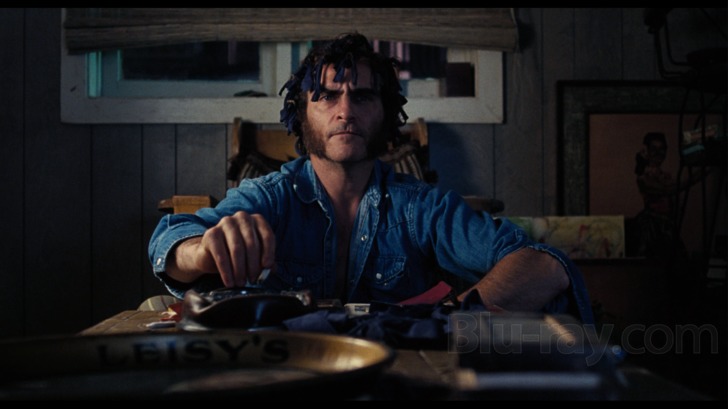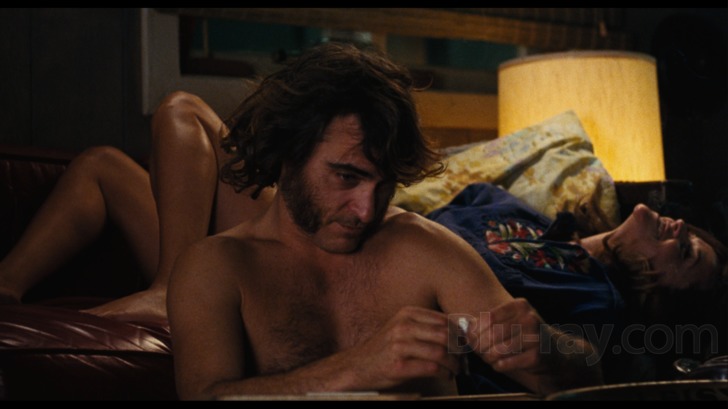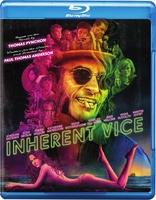Inherent Vice Blu-ray Movie
HomeInherent Vice Blu-ray Movie 
Blu-ray + DVD + UV Digital CopyWarner Bros. | 2014 | 149 min | Rated R | Apr 28, 2015
Movie rating
7.2 | / 10 |
Blu-ray rating
| Users | 4.5 | |
| Reviewer | 3.5 | |
| Overall | 3.6 |
Overview
Inherent Vice (2014)
Set in 1960s Los Angeles, drug-fueled detective Larry "Doc" Sportello investigates a kidnapping case. Based on the novel written by Thomas Pynchon.
Starring: Joaquin Phoenix, Josh Brolin, Owen Wilson, Katherine Waterston, Reese WitherspoonDirector: Paul Thomas Anderson
| Drama | Uncertain |
| Dark humor | Uncertain |
| Crime | Uncertain |
| Period | Uncertain |
| Film-Noir | Uncertain |
| Mystery | Uncertain |
| Romance | Uncertain |
Specifications
Video
Video codec: MPEG-4 AVC
Video resolution: 1080p
Aspect ratio: 1.85:1
Original aspect ratio: 1.85:1
Audio
English: DTS-HD Master Audio 5.1 (48kHz, 24-bit)
French (Canada): Dolby Digital 5.1
Spanish: Dolby Digital 5.1
Portuguese: Dolby Digital 5.1
Subtitles
English SDH, French, Portuguese, Spanish
Discs
50GB Blu-ray Disc
Two-disc set (1 BD, 1 DVD)
UV digital copy
DVD copy
Packaging
Slipcover in original pressing
Playback
Region free
Review
Rating summary
| Movie | 4.0 | |
| Video | 4.5 | |
| Audio | 4.5 | |
| Extras | 1.0 | |
| Overall | 3.5 |
Inherent Vice Blu-ray Movie Review
"One toke over the line, sweet Jesus, one toke over the line..."
Reviewed by Kenneth Brown April 19, 2015Inherent Vice teases viewers with an informal, burnt out indifference but it might just be writer/director Paul Thomas Anderson's least accessible film to date. And he knows it. Relishes it. Based on the 2007 novel of the same name by wildly elusive author Thomas Pynchon, the subversively funky, drug-addled counter-noir makes no demands yet demands everything. Your full attention above all, much as it seems that's the last thing it's asking for. It rambles, mumbles, wobbles, sighs, blows smoke, narrates hypnotically then sits idly by, and above all refuses to give chase. It doesn't care if it loses you. Confounds you. Overwhelms. Underwhelms. It runs away and races back, whispers something incoherent in your ear, mutters a joke, nabs a laugh, then lurches forward again with an inebriated, at-times infuriating, at-times mesmerizing cadence. Cases accumulate. Characters pile up. Motives criss-cross, double-cross and triple-cross three times over. You'll almost certainly need to commit to more than one viewing, if only to better track what the hell is going on. And still Anderson presses the advantage, challenging, cultivating, ducking and weaving, inviting his audience in; once, twice, again and again, spinning them in circles before asking 'em to walk a straight line. You thought The Master was divisive? You ain't seen nothin' yet.

"Was it possible that at every gathering, concert, peace rally, love-in, be-in, freak-in, here up north, back east, where ever, some dark crews had been busy all along reclaiming the music, the resistance to power, the sexual desire from epic to everyday? All they could sweep up for the ancient forces of greed and fear? Gee he thought, I don't know."
South Beach, California. 1970. When private eye Doc Sportello's (Joaquin Phoenix) ex-old lady, Shasta (Katherine Waterston), suddenly shows up with a story about her current billionaire land developer boyfriend (whom she just happens to be in love with) and a plot by his wife and her boyfriend to kidnap that billionaire and throw him in a loony bin... well, easy for her to say. It's the tail end of the psychedelic '60s, paranoia is running the day, and Doc knows that "love" is another one of those words going around at the moment, like "trip" or "groovy," that's being way too overused, except this one usually leads to trouble. With a cast of characters that includes surfers, hustlers, dopers and rockers, a murderous loan shark, LAPD Detectives, a tenor sax player working undercover, and a mysterious entity known as The Golden Fang, which may only be a tax dodge set up by some dentists, the film -- the first feature adaptation of a Thomas Pynchon novel -- is part surf noir, part psychedelic romp, all Pynchon.
Phoenix and Waterson are flanked by a lineup of scene-hogging A-listers and familiar character actors, each one -- even those who only show up for a glorified cameo -- in on one tightly guarded joke or another that's just out of reach. Josh Brolin. ("I hope this won't be another one of those unabridged paranoid hippie monologues I seem obliged to sit through.") Benicio del Toro. ("We got plenty of crime on the high seas.") Owen Wilson. ("Staying with a band I used to play for, The Boards, but none of them know it's me. Even when I was alive they didn't know it was me.") Martin Short. ("Why, you're another one of those hippie dope fiends, aren't ya? Here for a little perking up?") Reese Witherspoon. ("You, me, a tape machine, maybe another DDA to witness it?") Michael K. Williams. ("See, outside of Glen, I ain't never liked the company of Nazis.") Jena Malone. ("Everyone helpfully pointed out how the heroin was actually coming through my breast milk, but who could afford formula, ya know?") Maya Rudolph. (Doc, I love your afro!") Michelle Anne Sinclair. ("You gonna keep holding to that tank or you gonna marry it?")
The '70s subculture dialogue and pinched South Cali slang is as deceptively loose and fluid as the performances. Phoenix is in fine, spaced-out form, shedding The Master's brutally gullible Freddie Quell, summoning bits of Buffalo Soldiers' Ray Elwood, and using glazed eyes, a slack mouth and a childlike curiosity to conceal the surprisingly sharp private detective beneath the act. This layering is more than crucial. It's strangely compelling, if only because the desire to know what makes Doc tick becomes more and more nagging as he follows the clues to their not so inevitable conclusion. Never mind the narration. Never mind the suggestion that Shasta is central. (Though Waterson is just as terrific.) If Phoenix buckles or falls, the whole movie comes crashing down; a disaster avoided with the help of the aforementioned revolving door supporting cast. All color and quirk, Brolin, del Toro, Wilson, and company give Phoenix (and Waterson) ample room to work and enough leeway to make it all look effortless.
Inherent Vice doesn't wrap up neatly, or much at all, and any hope that it will should be abandoned long before tailing Doc to his first interview, much less his last. If that doesn't sit well with you, might as well find another movie to fill your Friday night slot. The story sprawls and sprawls, outward and beyond, and never contracts, to the point that what already feels free-wheeling and out of control begins to feel more so. It isn't Anderson's failing, though, or even Pynchon's. It isn't a missed opportunity at all. Like his previous films, Anderson is at his best when things threaten to slip through his fingers, and it's in his dealings with chaos, ambiguity and the madcap mundane that Inherent Vice comes together in ways all but ordained. It couldn't wrap up in any other fashion without betraying everything Anderson and Pynchon are driving at. The more Doc pursues the truth, the larger and more complex his case becomes. Pynchon's PI shoulders the burden of the entire hippie movement; dabbling in ideals and passions, rebelling in a haze of smoke, free love and rock-n-roll, and realizing -- often much too late -- that those in power mean to stay in power, that corruption is a means and an end for the sober, and that resistance is a dying man's game.
There are moments when style dominates substance -- not entirely uncharacteristic of Anderson, though usually not to this degree -- and others when it seems Anderson isn't concerned with making a coherent movie as much as he is capturing Pynchon's affection for unfilmable incoherence. (Reports from the set and interviews with cast members, while positive in nature, confirm as much.) Patience is required, multiple viewings are a must, and a certain level of trust in the director goes a long way. Inherent Vice isn't an easy film to fall for, much less enjoy, and offers nothing but postmodernistic frustration to anyone who isn't paying close attention at all times. And even if you follow everything, even if you "get it" right away or eventually, you won't necessarily like it. Anderson isn't gunning for your approval. He's working to evoke and provoke, and maybe, maybe do something more. If, that is, you're dogged enough to unravel the mystery beneath the mystery; the one that ties Inherent Vice to Pynchon than anything else.
Inherent Vice Blu-ray Movie, Video Quality 

Shot with 35mm Panavision Panaflex Millennium XL2 cameras, Inherent Vice arrives on Blu-ray with a striking 1080p/AVC-encoded video presentation that's faithful to Anderson and cinematographer Robert Elswit's photography. While a variety of scenes are bathed in natural light that sometimes dilutes the vibrancy of primaries, colors and skintones remain nicely saturated and lifelike throughout, contrast is filmic and satisfying, and black levels are well-preserved. There are numerous instances of muted shadows and several somewhat problematic sequences shot in low light, along with a prevailing softness, but each is inherent to the source and rarely a distraction. Not so inherent? Faint, easily overlooked edge halos are visible here and there (as was the case in the film's theatrical presentation), and crush is an almost negligible nuisance. Again, though, filmfans will be too busy with the image's quality to care about such small, infrequent issues. Detail is quite good, with wonderfully resolved fine textures and an unobtrusive veneer of grain, and close-ups are outstanding, with an impressive level of clarity. Moreover, the encode doesn't exhibit signs of any significant macroblocking, banding, errant noise or other anomalies. Bottom line: Inherent Vice couldn't look much better than it does here.
Inherent Vice Blu-ray Movie, Audio Quality 

No disappointment here either. Warner's DTS-HD Master Audio 5.1 surround track delivers the goods. Dialogue is tricky to evaluate, as several scenes feature near-indecipherable mumbling or muttering -- subtitles are our friends! -- but that very deliberate element of the film's sound design should in no way reflect on the quality of the lossless mix. Voices are clear and intelligible when they're meant to be, and perfectly suited to the tone and tenor of Anderson's chosen style and approach to Pynchon when they're not. Low-end output is subdued but strong, dynamics are excellent, and the rear speakers, though reserved, do a great job creating convincing dives, hotspots, hotel rooms, cramped offices, mansions, rehabilitation clinics. Directional effects and ambience are handled with care, cross-channel pans are smooth, and Jonny Greenwood's music haunts the soundscape beautifully. Even when Inherent Vice is at its quietest or most erratic, Warner's lossless track holds true to Anderson's every intention.
Inherent Vice Blu-ray Movie, Special Features and Extras 

- Los Paranoias (HD, 2 minutes): A promo for the movie, narrated by Shasta (Katherine Waterston).
- Shasta Fay (HD, 1 minutes): Another promo, again featuring Shasta's musings.
- The Golden Fang (HD, 2 minutes): An in-depth, extensive documentary? Nah. Just another trailer.
- Everything in this Dream (HD, 6 minutes): The longest of the disc's extras is a deleted/alternate sequence.
Inherent Vice Blu-ray Movie, Overall Score and Recommendation 

Paul Thomas Anderson has never been a filmmaker of the people, but Inherent Vice will even divide the faithful Anderson fold. Savoring all it has to offer requires multiple viewings (if only to be rid of the expectations that tend to taint the first viewing), a keen eye, and patience, patience, patience. There's richness here, as well as a psychedelic verve that embraces the genre and subverts it, captures Pynchon without being beholden to him, and carves out another unique corner of the Anderson canon. Warner's Blu-ray is excellent too, so long as you aren't hoping for any special features of substance. There aren't any. What you will find is a terrific AV presentation; one that makes those multiple viewings that much easier to absorb.
Similar titles
Similar titles you might also like

Kiss Me Deadly
1955

The Black Dahlia
2006

The Long Goodbye
4K Restoration
1973

L.A. Confidential
1997

In the Heat of the Night 4K
1967

The Crimson Kimono
Limited Edition to 3000
1959

Devil in a Blue Dress 4K
1995

Bad Lieutenant: Port of Call New Orleans
2009

Blue Velvet 4K
1986

The Secret in Their Eyes
El Secreto de Sus Ojos
2009

Gone Baby Gone
2007

Cutter's Way
Limited Edition to 3000
1981

Chinatown 4K
Standard Edition
1974

American Gigolo 4K
Standard Edition
1980

The Shadow on the Window
1957

Phantom Lady
1944

The Killers
1946

Dark City
1950

Boomerang
1947

Red Riding: The Year of Our Lord 1974
2009
